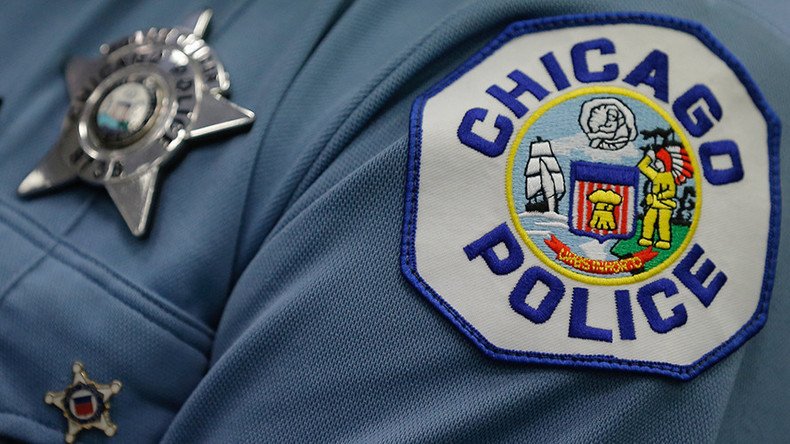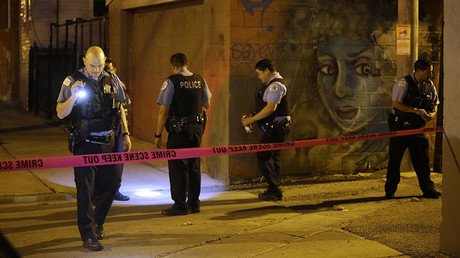Chicago deploys more police as death toll hits 500

Despite a boost in police numbers, Chicago, Illinois has recorded its 500th homicide for the year, with 11 people killed and more than 30 wounded in shooting incidents over the weekend.
Among those killed was a pregnant woman, and two people who lived on the same block, according to the Chicago Tribune.
This Weekend's Chicago "Shoot-a-Rahm-a" - 10 Dead, 30 Wounded, 500 Homicides Year-To-Date https://t.co/kXGSaMUVEz
— zerohedge (@zerohedge) September 18, 2017
Four people were killed in Brighton Park on Friday as they traveled in a car, police said, adding that the latest bloodshed resulted from an ongoing gang war in the Southwest Side neighborhood.
The neighborhoods of Brighton Park and Back of the Yards have been the scene of dozens of rifle shootings since early 2016. In February, rival gangs were reported to have stepped up their use of assault rifles.
Last year was the most violent in Chicago in decades, with many residents using the nickname "Chiraq" to compare it to Middle Eastern war zones.
In the first four months of 2017, more than 1,000 people were shot and nearly 200 homicides were reported in Chicago. Last year was the most violent in Chicago for the past 20 years, reaching 500 homicides by late August.
Over 2,700 people were shot in Chicago this year, a more than 11 percent decrease from the 3,066 shot during the same time last year, according to Tribune data. So far, the number of homicides is down about 7 percent from this time last year, according to the Tribune. The city of 2.7 million still has the second-highest violent crime rate in the US.
Mayor Rahm Emanuel, a Democrat, announced Sunday that nearly 100 new Chicago police officers have hit the streets, according to WBN-TV.
Nearly two dozen are to be stationed in Englewood on the South Side, which has a predominately African American population (93 percent) and some of the city’s poorest housing and inadequate services.
Emanuel said the new officers are part of an effort to increase the police presence while taking “kids, guns and gangs off the streets.”
“The Englewood community is one of the toughest, and they’re leading in the decline in the city and we want to see that in every neighborhood,” the mayor said in a statement.
As well as over 2500 shootings......
— LE Action Network (@LE_Action) September 16, 2017
Chicago Closes in On 500 Homicides | https://t.co/lObfcdC2Kmhttps://t.co/3CDAcWSbsvpic.twitter.com/ENhBf24I9i
Emanueltouted a 45 percent decline in shootings in the neighborhood in the past year, including a 30 percent decrease in homicides.
City officials plan to add an additional 1,000 officers to the force over the next two years. Police have seized more than 5,000 guns from the city’s streets this year.
Mayor Emanuel’s plan may be affected by an ongoing lawsuit filed by Chicago against the Department of Justice, however. Chicago sued the DOJ after Attorney General Jeff Sessions announced in July that "sanctuary cities" would not receive law enforcement funding from the DOJ. Chicago expected $3.2 million in grants.
A Chicago judge filed an injunction against the DOJ policy on Friday, preventing it from going into effect until the lawsuit is decided. Chicago refuses to comply with federal demands to help immigration authorities detain and deport illegal immigrants.
A report in 2013 said most of Chicago’s violent crime came from gangs trying to maintain control of drug-selling territories, and specifically related to the activities of Mexico's Sinaloa Cartel, which was working to control illicit drug distribution against local street gangs, according to Bloomberg.
Violence in Chicago is often hyped by the media, Grammy-nominated rapper Vic Mensa told RT's Larry King last month.
“Violence in Chicago is often sensationalized and it’s turned into a headline. It is used for the benefit of people in the media and people in power. It is looked at very one dimensionally without observing the factors that have created this violence,” Mensa told King. “The fact that you can live your entire life in Lincoln Park, Chicago and not hear a gunshot, but be in a different neighborhood and hear gunshots every night.”
The tally for the number of homicides is also in dispute. The Chicago Tribune keeps a running tally and said the weekend’s death toll took the year’s total past 500, whereas the Chicago Police Department said the number was 486. The Tribune counts all homicides, including those counted as justifiable.













